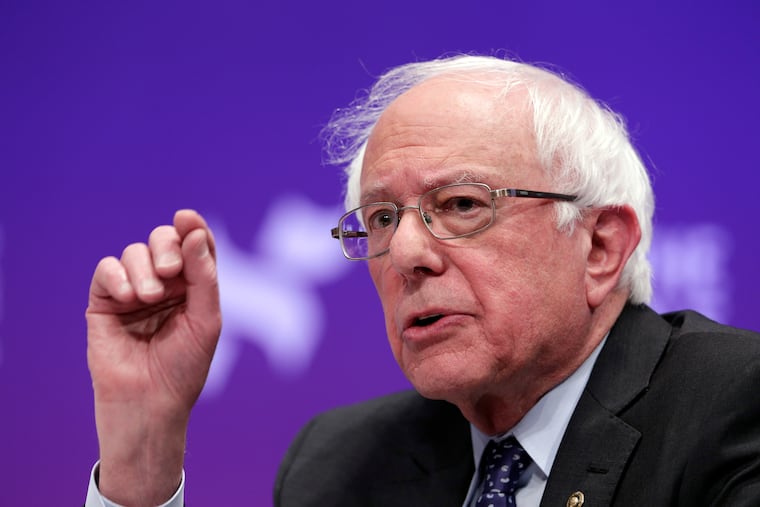Bernie Sanders: America’s criminal justice revolution can start with Philadelphia’s primary | Opinion
Your votes in your city’s upcoming election can start to fix our broken criminal justice system, the presidential candidate writes.

After decades of politicians in Washington supporting mass incarceration, America is now spending $80 billion a year to lock up 2.2 million people — the highest incarceration rate in the world. What’s more, in a country that prides itself on the principle of presuming innocence, nearly half a million people who are in jail across the country haven’t even been convicted of any crime — and that includes roughly 60 percent of all prisoners in Pennsylvania. That is because many people accused of a crime cannot afford bail.
This creates a modern-day debtors prison. Add to that a racial wealth gap that leaves African American and Latino communities with higher rates of poverty, and “tough on crime” policies that disproportionately target those same communities, and what we have is a criminal justice system that is effectively criminalizing communities of color.
This is an international embarrassment — one that I and other progressives have been opposing for years in Congress. Our government today makes sure Wall Street criminals get bailouts and never face charges in a courtroom, while low-income people are locked away in jail cells simply because they are poor and have inadequate legal counsel.
When our movement defeats Donald Trump in 2020, things are finally going to change. But even before we get to that presidential election, the people of Philadelphia have an opportunity to start making changes right now in 2019. On May 21, you will have a chance to vote for local judicial candidates who pledge to end cash bail.
Philadelphia has been leading this reform effort for a while now. Community organizers created the Philadelphia Community Bail Fund to help those in need, including many juveniles, avoid having their lives torn apart with unnecessary jail time. Philadelphia’s City Council passed a resolution calling for the end of cash bail, the editorial board of The Inquirer has joined in this chorus demanding action, and District Attorney Larry Krasner has unilaterally put an end to the practice of seeking cash bail on low-level offenses.
To continue this progress, I hope the citizens of Philadelphia cast their votes for progressive judicial candidates in this month’s primary election, and get their friends, family, and neighbors out to vote.
Efforts like these in Philadelphia are critical parts of a larger national movement that will help us ultimately make nationwide change. That is going to start with us passing the No Money Bail Act. This bill, which I introduced last year, would formally end the use of secured bonds in federal criminal proceedings, provide grants to states that wish to implement alternate pretrial systems to reduce their pretrial detention population, and withholds grant funding from states that continue to use money bail systems. It would also require a study three years after implementation to ensure the new alternate systems are also not leading to disparate detention rates.
Making this kind of change will not come easy. The for-profit bail industry makes more than $2 billion each year from a predatory system that profits off the plight of poor defendants. This powerful industry will spend heavily to maintain the United States’ status as one of only two countries in the world that even allows for-profit bond companies.
But we cannot use that as an excuse to stand down. We must instead see ending cash bail as a critical part of the larger effort to comprehensively reform our entire criminal justice system. This means ending the destructive war on drugs, legalizing marijuana, and expunging the records of the so many African Americans and Latinos who have been jailed for marijuana possession.
It means putting an end to mandatory minimum sentences, reinstating the federal parole system, reforming civil asset forfeitures, abolishing the death penalty, and bringing about major police department reforms. It also means that we must "ban the box” to stop employment discrimination against ex-convicts and make sure Americans with criminal records retain their constitutional right to vote.
With this critical judicial primary on May 21, the people of Philadelphia have a chance to prove to the world that this kind of revolution in criminal justice is possible in America.
Your votes in your city’s election can start to fix our broken criminal justice system — and then your votes in the 2020 presidential election can help us bring that change to the entire country.
Bernie Sanders represents Vermont in the U.S. Senate. He is running for president in the 2020 election.